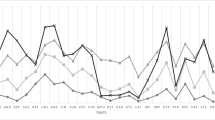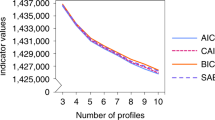Abstract
A. T. Beck (1983) has proposed the existence of two personality dimensions, sociotropy and autonomy, as specific and influential factors in the onset, course, and treatment of major depression. In this study, the stability and discriminant validity of the Revised Personal Style Inventory (PSI-II), a measure designed to assess the sociotropy and autonomy dimensions, was examined with a sample of outpatients diagnosed with major depression receiving pharmacotherapy. Sociotropy and autonomy were found to be relatively stable across time, despite significant reductions in depression severity. The two personality dimensions also produced a distinct and thematically consistent pattern of correlations with the dimensions and facets of the five-factor model of personality. These results suggest that the sociotropy and autonomy dimensions, as measured by the PSI-II, are reliable and valid measures of these personality constructs.
Similar content being viewed by others
REFERENCES
Alden, L. E., & Bieling, P. J. (1996). Interpersonal convergence of personality constructs in dynamic and cognitive models of depression. Journal of Research in Personality, 30, 60–75.
American Psychiatric Association. (1994). Diagnostic and statistical manual of mental disorders (4th ed.) Washington, DC: American Psychiatric Association.
Arieti, S., & Bemporad, J. (1980). The psychological organization of depression. American Journal of Psychiatry, 137, 1360–1365.
Bagby, R. M., Parker, J. D. A., Joffe, R. T., & Buis, T. (1994). Reconstruction and validation of the Depressive Experiences Questionnaire. Assessment, 1, 59–68.
Bagby, R. M., Parker, J.D. A., Joffe, R. T., Schuller, D., & Gilchrist, E. (1998). Confirmatory factor analysis of the revised Personal Style Inventory. Assessment, 5, 31–43.
Bagby, R. M., & Rector, N. A. (1998). Self-criticism, dependency and the five factor model of personality in depression: Assessing construct overlap. Personality and Individual Differences, 24, 895–897.
Barnett, P. A., & Gotlib, I. H. (1988). Psychosocial functioning and depression: Distinguishing among antecedents, concomitants, and consequences. Psychological Bulletin, 104, 97–126.
Beck, A. T. (1967). Depression: clinical, experimental, and theoretical aspects. New York: Hoeber.
Beck, A. T. (1978). Depression Inventory. Philadelphia: Center for Cognitive Therapy.
Beck, A. T. (1983). Cognitive therapy of depression: New perspectives. In P. J. Clayton & J. E. Barrett (Eds.), Treatment of depression: Old controversies and new approaches (pp. 265–290). New York: Raven.
Beck, A. T., Epstein, N., Harrison, R. P., & Emery, G. (1983). Development of the Sociotropy-Autonomy Scale: A measure of personality factors in psychopathology. Unpublished manuscript, Center for Cognitive Therapy, University of Pennsylvania Medical School, Philadelphia, PA.
Blatt, S. J. (1974). Levels of object representation in anaclitic and introspective depression. Psychoanalytic Study of the Child, 29, 107–157.
Blatt, S. J. (1991). A cognitive morphology of psychopathology. Journal of Nervous and Mental Disease, 179, 449–458.
Blatt, S. J., D'Afflitti, J. P., & Quinlan, D. M. (1976). Depressive Experiences Questionnaire. New Haven, CT: Yale University Press.
Blatt, S. J., Quinlan, D. M., Pilkonis, P. A., & Shea, T. (1995). Impact of perfectionism and need for approval on the brief treatment of depression: The National Institute of Mental Health Treatment of Depression Collaborative Research Program revisted. Journal of Clinical and Consulting Psychology, 63, 132–135.
Blatt, S. J., & Shichman, S. (1983). Two primary configurations of psychopathology. Psychoanalysis and Contemporary Thought, 6, 187–254.
Blatt, S. J., Zuroff, D. C., Quinlan, D. M., & Pilkonis, P. A. (1996). Interpersonal factors in brief treatment of depression: Further analyses of the National Institute of Mental Health Treatment of Depression Collaborative Research Program. Journal of Clinical and Consulting Psychology, 64, 162–171.
Bowlby, J. (1977). The making and breaking of affectional bonds: I: Aetiology and psychopathology in light of attachment theory. British Journal of Psychiatry, 130, 201–210.
Cappeliez, P. (1993). The relationship between Beck's concepts of sociotropy and autonomy and the NEO-Personality Inventory. British Journal of Clinical Psychology, 32, 78–80.
Clark, D. A., & Beck, A. T. (1991). Personality factors in dysphoria: A psychometric refinement of Beck's Sociotropy-Autonomy Scale. Journal of Psychopathology and Behavioral Assessment, 13, 369–388.
Costa, P. T., & McCrae, R. R. (1985). The NEO Personality Inventory manual. Odessa, Fl: Psychological Assessment Resources.
Costa, P. T., & McCrae, R. R. (1992). NEO PI-R professional manual: Revised NEO PI Personality Inventory (NEO PI-R) and NEO Five-Factor Inventory (NEO-FFI). Odessa, Fl: Psychological Assessment Resources.
Coyne, J. C., & Gotlib, I.H. (1983). The role of cognition in depression:Acritical appraisal. Psychological Bulletin, 94, 472–505.
Coyne, J. C., & Whiffen, V. E. (1995). Issues in personality as diathesis for depression: The case of sociotropy-dependency and autonomy-self-criticism. Psychological Bulletin, 118, 358–378.
Dunkley, D. M., Blankstein, K. R., & Flett, G. L. (1997). Specific cognitive-personality vulnerability styles in depression and the five-factor model of personality. Personality and Individual Differences, 23, 1041–1053.
Fairbrother, N., & Moretti, M. (1998). Sociotropy, autonomy, and self-discrepancy: Status in depressed, remitted depressed, and control participants. Cognitive Therapy and Research, 22, 279–296.
First, M. B., Spitzer, R. L., Gibbon, M., & Williams, J. B.W. (1995). Structured interview for DSM-IV Axis I disorders (Patient ed., Version 2). New York: New York Biometric Research Department.
Hamilton, M. (1967). Development of a rating scale for primary depressive illness. Journal of Clinical Psychology, 6, 278–296.
Klein, M. H., Wonderlich, S., & Shea, M. T. (1993). Models of relationships between personality and depression: Toward a framework for theory and research. In M. H. Klein, D. J. Kupfer, & M. T. Shea (Eds.), Personality and depression. New York: Guilford.
Mongrain, M. (1993). Dependency and self-criticism located within the five-factor model of personality. Personality and Individual Differences, 15, 455–461.
Peselow, E. D., Fieve, R. R., & DiFiglia, C. D. (1992). Personality traits and response to desipramine. Journal of Affective Disorders, 24, 209–216.
Piedmont, R. L. (1998). The Revised NEO Personality Inventory: Clinical and research applications. New York: Plenum.
Ouimette, P., Klein, D. N., Anderson, R., Riso, L. P., & Lizardi, H. (1994). Relationship of socio tropy/autonomy and dependency/self-criticism to DSM-III-R personality disorders. Journal of Abnormal Psychology, 103, 743–749.
Rector, N. A., Bagby, R. M., Segal, Z. V., Joffe, R. T., & Levitt, A. (2000). Self-criticism and dependency in depressed patients treated with cognitive therapy or pharmacotherapy. Cognitive Therapy and Research, 24, 569–582.
Robins, C. J. (1995). Personality-event interaction models of depression. European Journal of Personality, 9, 367–378.
Robins, C. J., Bagby, R. M., Rector, N. A., Lynch, T. R., & Kennedy, S. H. (1997). Sociotropy, autonomy, and patterns of symptoms in patients with major depression: A comparison of dimensional and categorical approaches. Cognitive Therapy and Research, 21, 285–300.
Robins, C. J., Hayes, A. H., Block, P., Kramer, R. J., & Villena, M. (1995). Interpersonal and achievement concerns and the depressive vulnerability and symptom specificity hypothesis: A prospective study. Cognitive Therapy and Research, 19, 1–20.
Robins, C. J., Ladd, J. S., Welkowitz, J., Blaney, P. H., Diaz, R., & Kutcher, G. (1994). The Personal Style Inventory: Preliminary new measures of sociotropy and autonomy. Journal of Psychopathology and Behavioral Assessment, 16, 227–300.
Rosenthal, R., & Rosnow, R. L. (1984). Essentials of behavioral research. New York: McGraw-Hill.
Santor, D. A., Bagby, R. M., & Joffe, R. T. (1997). Stability and change in personality and depression. Journal of Personality and Social Psychology, 73, 1354–1362.
Segal, Z. V., Shaw, B. F., Vella, D. D., & Katz, R. (1992). Cognitive and life stress predictors of relapse in remitted unipolar depressed patients: A test of the congruency hypothesis. Journal of Abnormal Psychology, 101, 26–36.
Shrout, P. E. (1995). Reliability. In M. T. Tsuang, M. Tohen, & G. E. P. Zahner (Eds.), Textbook in psychiatric epidemiology (pp. 213–227). New York: Wiley-Liss.
Solomon, A., Haaga, D. A. F., Kirk, L., & Friedman, D. G. (1998). Priming irrational beliefs in recovered depressed people. Journal of Abnormal Psychology, 107, 440–449.
Spitzer, R. L., & Endicott, J. (1979). Schedule for affective disorders and schizophrenia (3rd ed.,) Lifetime Version. New York: New York State Psychiatric Institute.
Zettle, R. D., Haflich, J. L., & Reynolds, R. A. (1992). Responsivity to cognitive therapy as a function of treatment format and client personality dimensions. Journal of Clinical Psychology, 48, 787–797.
Zuroff, D. C. (1994). Depressive personality styles and the five-factor model of personality. Journal of Personality Assessment, 46, 453–472.
Zuroff, D.C., Blatt, S. J., Sanislow, C. A., Bondi, C. M., & Pilkonis, P.A. (1999). Vulnerability to depression: Reexamining state dependence and relative stability. Journal of Abnormal Psychology, 108, 76–89.
Author information
Authors and Affiliations
Rights and permissions
About this article
Cite this article
Bagby, R.M., Gilchrist, E.J., Rector, N.A. et al. The Stability and Validity of the Sociotropy and Autonomy Personality Dimensions as Measured by the Revised Personal Style Inventory. Cognitive Therapy and Research 25, 765–779 (2001). https://doi.org/10.1023/A:1012975524455
Issue Date:
DOI: https://doi.org/10.1023/A:1012975524455




